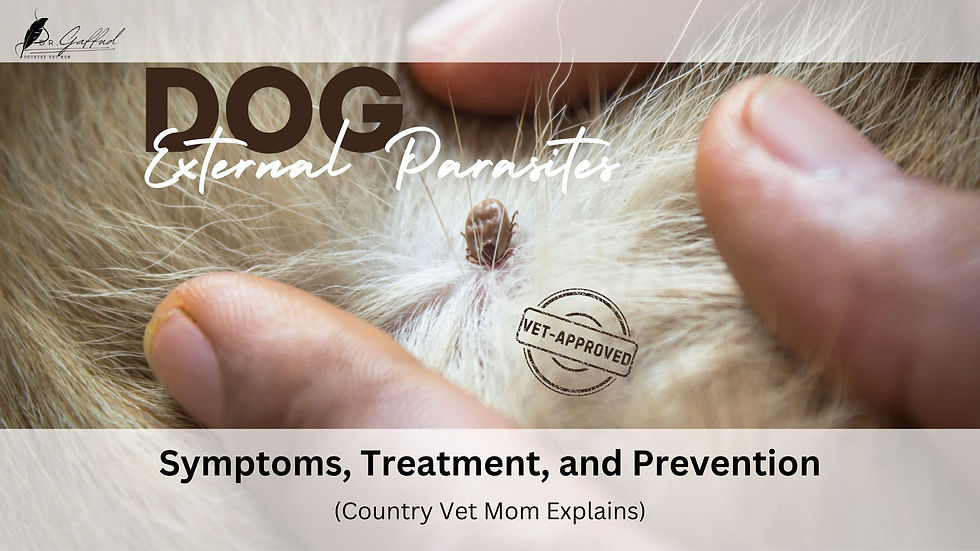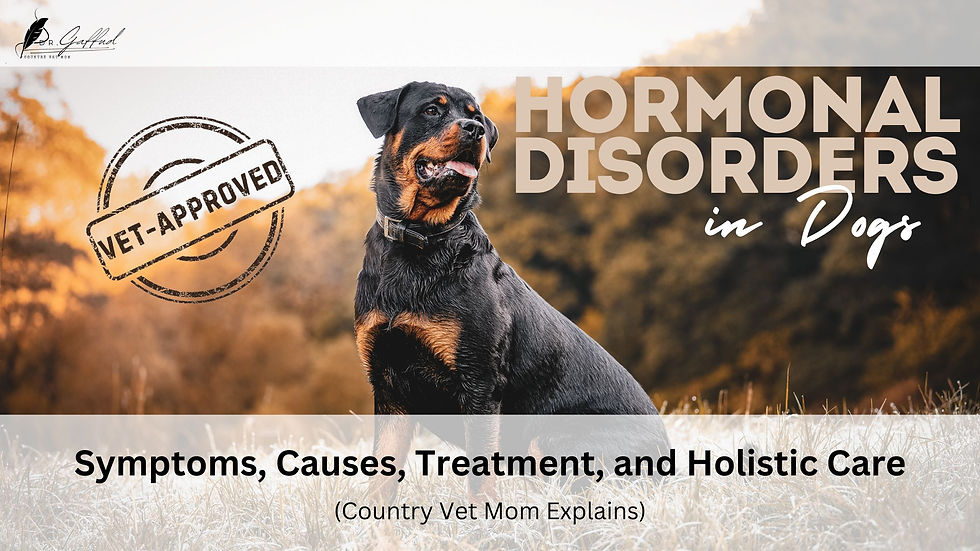Skin Infections in Dogs: Causes, Symptoms, Diagnosis, and Holistic Care
- Dr. Gaffud

- Sep 30, 2024
- 5 min read
Updated: Oct 20, 2025

Skin infections in dogs are common issues that cause significant discomfort and lead to more serious health problems if not treated properly. These infections range from mild irritations to severe conditions requiring immediate medical attention. Understanding the causes, recognizing the symptoms, and knowing the treatment options are essential for pet owners to ensure their dog's health and well-being.
Dandruff | Allergic Dermatitis | Ringworm | Candidiasis | Alopecia |
Pyoderma | Fleas | Folliculitis | Impetigo | Mange | Seborrhea | Skin Tumors
Topics:
What is a Skin Infection in Dogs?
A skin infection in dogs occurs when bacteria, fungi, or parasites invade the skin and cause inflammation, irritation, or lesions.
These infections are localized to one area or spread over the dog's body, depending on the cause and severity. Skin infections affect any breed and age, although certain breeds with skin folds or allergies are more predisposed.
What are the Causes of Skin Infections in Dogs?
Skin infections in dogs are caused by various factors, including:
Bacterial Infections: The most common cause of skin infections in dogs, often resulting from a break in the skin or a compromised immune system. Staphylococcus bacteria are a typical culprit.
Fungal Infections: Fungi such as yeast and ringworm cause skin infections, especially in warm and humid environments.
Parasites: Fleas, ticks, and mites irritate the skin, leading to secondary infections.
Allergies: Dogs develop skin infections from allergic reactions to food, environmental factors, or flea bites, leading to scratching and subsequent infection.
Hormonal Imbalances: Conditions like hypothyroidism or Cushing’s disease make dogs more susceptible to skin infections.
Poor Nutrition: Inadequate diets lacking essential nutrients weaken the skin's natural defenses.
Environmental Factors: Dirty or damp living conditions promote skin infections in dogs.
Most Common Types of Dog Skin Infections
Understanding skin infection types helps identify the right treatment and preventive measures. Some common skin infections in dogs are discussed below.
Dandruff
Dandruff in dogs is characterized by flaky, dry skin. It is caused by dry weather, poor diet, or skin allergies. While often not a severe condition, it leads to scratching and secondary infections if not managed.
Allergic Dermatitis
Allergic dermatitis is a skin reaction to allergens like pollen, mold, or certain foods. It leads to itching, redness, and inflammation, resulting in bacterial infections if the dog scratches excessively.
Ringworm
Ringworm is a fungal infection that presents as circular patches of hair loss with a red, crusty border. It is highly contagious to both other pets and humans.
Candidiasis
Candidiasis is a yeast infection that often occurs in the ears, mouth, or folds of the skin. It causes itching, redness, and a distinctive odor.
Alopecia
Alopecia refers to hair loss, which is a symptom of various skin conditions, including infections, allergies, or endocrine disorders.
Pyoderma
Pyoderma is a bacterial skin infection that results in pustules, redness, and sometimes pus-filled lesions. It is often secondary to other conditions like allergies or parasites.
Fleas
Fleas are external parasites that cause itching and skin irritation. Infestations lead to flea allergy dermatitis and secondary infections due to scratching.
Folliculitis
Folliculitis is an infection of the hair follicles, often caused by bacteria. It presents as small, red bumps or pustules, leading to itching and hair loss.
Impetigo
Impetigo is a bacterial infection commonly seen in puppies. It causes small, pus-filled blisters that burst and form crusty scabs.
Mange
Mange is caused by mites that burrow into the skin, causing intense itching, hair loss, and secondary bacterial infections.
Seborrhea
Seborrhea is a condition that causes the skin to produce excessive oils, leading to greasy, flaky skin and a distinctive odor. It is a primary condition or secondary to other skin infections.
Skin Tumors
While not always infectious, skin tumors appear similar to skin infections and require a veterinary examination to determine the cause, tumors sometimes ulcerate or become infected.
What are the Symptoms of Skin Infections in Dogs?
Symptoms of skin infections in dogs vary depending on the type and severity but commonly include:
Redness and inflammation
Itching and scratching
Hair loss or bald patches
Pustules or blisters
Scabs or crusty areas
Foul odor
Thickened or discolored skin
Pain or discomfort when touched

What is the Treatment for Skin Infections in Dogs?
The treatment for skin infections in dogs depends on the cause and severity of the infection. Common treatments are listed below.
Antibiotics: Used to treat bacterial infections such as pyoderma or impetigo.
Antifungals: Prescribed for fungal infections like ringworm or candidiasis.
Topical Treatments: Creams, ointments, or shampoos are applied directly to the skin to reduce inflammation and fight infection.
Antiparasitics: Medications to eliminate parasites like fleas, ticks, or mites causing the infection.
Allergy Management: For allergic dermatitis, identifying and avoiding allergens, along with using antihistamines or steroids, help manage symptoms.
Nutrition: Improving the dog's diet supports skin health and boosts the immune system.
Holistic Care for Skin Infections in Dogs
Holistic care complements traditional treatments and promotes overall skin health. Some holistic approaches are listed below.
Probiotics: Adding probiotics to a dog’s diet helps support gut health and improve the immune system, potentially reducing allergic reactions and infections.
Herbal Remedies: Certain herbs, such as calendula and chamomile, are applied topically to soothe irritated skin and promote healing.
Coconut Oil: Known for its antibacterial and antifungal properties, coconut oil is applied to the skin or added to the diet to support skin health.
Regular Grooming: Keeping a dog's coat clean helps prevent infections. Regular bathing with natural shampoos reduces allergens and parasites.
Dietary Changes: Feeding a balanced, nutritious diet improves skin health. Adding omega-3 fatty acids reduces inflammation and improves the skin barrier.
Skin infections in dogs are challenging conditions to manage, but with proper care, treatment, and preventive measures, paw-rents help keep their dog's skin healthy and infection-free. Holistic care options provide additional support, promoting overall wellness and preventing future issues.
FAQs:
Why Do Dogs Have Skin Infections?
Dogs develop skin infections due to a variety of factors, including bacterial, fungal, and parasitic infections, allergies, poor nutrition, or underlying health conditions.
How To Tell if A Dog Has a Bacterial Skin Infection?
A bacterial skin infection often presents with symptoms like redness, swelling, pustules, hair loss, and a foul odor. Veterinarians diagnose a bacterial infection through a physical exam and lab tests.
Are Dog Skin Infections Contagious?
Some skin infections, such as ringworm and mange, are contagious to other pets and humans. Bacterial and fungal infections also spread if the conditions are right.
What Causes Skin Infections in Dogs and How Are They Prevented?
Bacteria, fungi, parasites, or allergies cause skin infections. Preventive measures include maintaining good hygiene, regular grooming, a balanced diet, parasite control, and avoiding allergens.
What are the Common Treatments for Dog Skin Infections?
Common treatments include antibiotics for bacterial infections, antifungals for fungal infections, topical treatments for localized infections, and antiparasitics for parasites.
When To Consult a Veterinarian for Dog Skin Infections?
If a dog shows signs of a skin infection, such as persistent itching, redness, hair loss, or unusual odor, it's important to consult a veterinarian for proper diagnosis and treatment.
Are Dog Skin Infections Caused by Allergic Reactions?
Yes, allergic reactions to food, environmental factors, or flea bites cause skin infections. Allergies lead to itching and scratching, which break the skin and allow infections to develop.
How To Prevent Recurrence of Skin Infections in Dogs?
Preventing recurrence involves maintaining good hygiene, proper nutrition, regular vet check-ups, and addressing underlying conditions like allergies or hormonal imbalances.
Are There Home Remedies for Managing Dog Skin Infections?
Some mild skin infections are managed with home remedies like coconut oil, apple cider vinegar, or herbal washes. However, it's important to consult a veterinarian before starting any home treatment to ensure it's safe and effective for the dog's specific condition.




I learned to check my dog’s skin every time he scratches a lot!
We battled recurring skin issues for months; I wish I’d had this guide then. Dr. Gaffud always manages to make complex topics feel manageable.
Dealt with recurring hot spots before—this article’s prevention tips actually work.